
Can Sony's Xperia ZL break out of the pack?
Andrew Cunningham
Since we reviewed Sony's Xperia Ion less than a year ago, we've had a sense that Sony has been playing catch-up to the rest of the Android handset makers. The Xperia TL "Bond Phone" only reinforced this notion. There's nothing that's necessarily wrong with the phone, but the fact remains that it came with hardware and software very similar to the Galaxy S III, some six months after the S III came to market.
Today we're taking a look at the Xperia ZL, the slightly cheaper, non-waterproof version of the Xperia Z that we handled at CES and dunked in a fish tank at Mobile World Congress. While you won't want to take it swimming with you, the ZL runs the same Android 4.1-based software on the same quad-core Qualcomm hardware and 5-inch, 1080p display as the Z.
As such, this should be a pretty good window into the state of Sony's high-end phones. So is Sony still in catch-up mode, or is the ZL a phone that holds its own against the likes of the HTC One and Galaxy S 4?
| Specs at a glance: Sony Xperia ZL | |
|---|---|
| Screen | 1920x1080 5" (441 ppi) TFT |
| OS | Android 4.1.2 "Jelly Bean" |
| CPU | Quad-core 1.5GHz Qualcomm Snapdragon S4 Pro |
| RAM | 2GB |
| GPU | Qualcomm Adreno 320 |
| Storage | 16GB NAND flash, expandable via microSD |
| Networking | 802.11a/b/g/n, Bluetooth 4.0, NFC, LTE |
| Ports | Micro-USB, headphones |
| Camera | 13MP rear camera, 2MP front camera |
| Size | 5.18" ? 2.7" ? 0.39"?(131.6 ? 68.6 ? 9.9 mm) |
| Weight | 5.33 oz (151.1 g) |
| Battery | 2370 mAh (non-removable) |
| Starting price | $759.99 unlocked; TBA on-contract |
| Sensor | Ambient light sensor, GPS |
Body and build quality
Some companies' devices just have a certain feel to them. Samsung's phones and tablets are usually some combination of light, plasticky, and slippery. Sony's often have a nice heft to them, a hard-to-define feeling suggestive of a well-built consumer electronic device. Handling a PSP or PS Vita (or the Xperia Z and Tablet Z) feels the same way, and between that and the lightly curved, textured plastic back, the phone feels good to hold despite its relatively large screen.
The phone is also a bit narrower and shorter than some of its 5-inch compatriots (2.7" wide and 5.18" tall, where the S 4 is 2.75" wide and 5.38" tall), and has narrower bezels all around the screen than many other phones do. This doesn't quite give it the "mini handheld feel" that Sony advertises on the phone's product page, but it does make the handset more comfortable to use.
The phone's je ne sais quoi does have an unfortunate impact on its weight and thickness: it weighs 5.33 ounces (compared to 4.06 for the S 4) and is 0.39" thick (compared to 0.31"). Both differences are merely noticeable rather than inconvenient, but if you're especially sensitive to your phone's weight, the ZL is heavier than most of its contemporaries (and the Xperia Z, which weighs 5.15 ounces and is 0.31" thick).
The top
The phone's sides are a little less stuffed with ports than some we've seen. There's a headphone jack on the top?
Andrew Cunningham
-
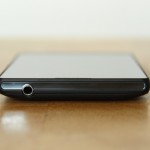
The top
The phone's sides are a little less stuffed with ports than some we've seen. There's a headphone jack on the top?
Andrew Cunningham
-
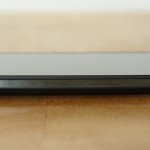
The left
?and a micro USB port on the left side.
Andrew Cunningham
-
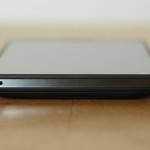
The bottom
The bottom of the phone is unadorned.
Andrew Cunningham
-
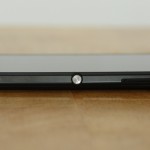
The right
You'll find all the buttons on the phone's right-hand side. From left to right: there's a two-stage shutter button similar to those found in dedicated point-and-shoots; Sony's rounded, clicky power button; and a volume rocker.
Andrew Cunningham
-
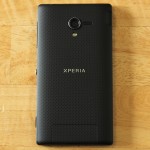
The back
The phone's curved back is made of a slightly rubbery, textured hard plastic that makes it easy to grip. Note the camera lens, which protrudes from the back of the phone; the LED flash; and the single rear-facing speaker. The camera can take 13MP shots at a 4:3 aspect ratio and 9MP shots at 16:9.
Andrew Cunningham
-
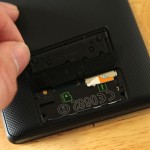
Peek-a-boo
The SIM slot and microSD card slot are hiding out under the phone's back panel.
Andrew Cunningham
-
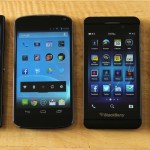
Phones in a row
From left to right (and largest to smallest): the Xperia ZL, the Nexus 4, the BlackBerry Z10, and the iPhone 5.
Andrew Cunningham
?
The phone has a single rear-facing speaker that sounds like most phone speakers do: loud enough for looking at YouTube videos in groups, but too tinny for much else. It's adjacent to the phone's camera lens, which protrudes from the back of the phone and keeps the speaker from being muffled when set on a desk or table. The sound is actually better when it's being bounced off of a hard surface.
Like the construction of the phone itself, the 5-inch 1080p display is a mixed blessing. As with the other high-density screens we've seen lately, text and (optimized) graphics are amazingly (and perhaps pointlessly) crisp. The problems start when you begin to tilt this screen away from you?some color and brightness shift is normal in LCD screens, but the ZL's viewing angles are much worse than what we're used to seeing in smartphones.
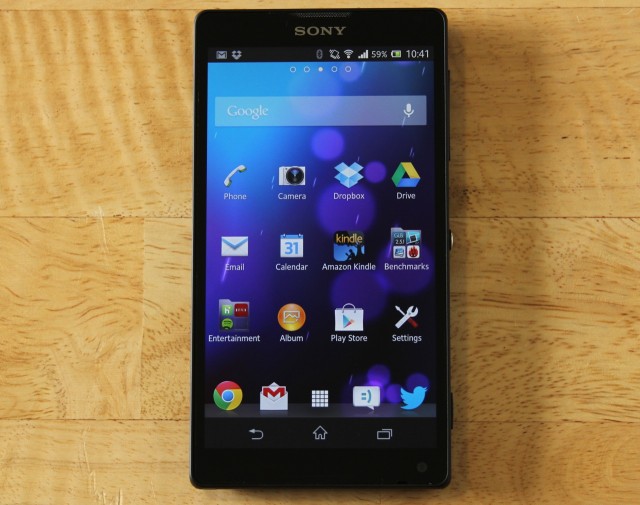
Andrew Cunningham

Andrew Cunningham
It's true that you're often looking at a smartphone head-on, and when you do, these viewing angles don't present a real problem. The issues arise when the phone is lying on your desk or table, or if you're sliding it out of your pocket for a moment to sneak a quick peak. The problem doesn't make the phone unusable, but it's one disadvantage that other phones in this price range don't normally have.
Cameras
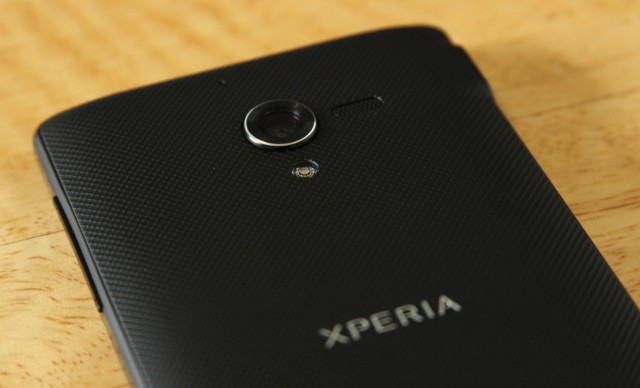
Andrew Cunningham
The cameras in Android phones are only occasionally worth writing home about. They usually slap a high megapixel count on something that takes suitable-for-Facebook snapshots and leave it at that. Sony, however, has an established reputation as a maker of pretty good mobile camera sensors?they've supplied the parts for the last couple of iPhones?and the ZL's 13MP camera is actually worth a second look.
Compare these three scenes from the ZL and an iPhone 5, one taken indoors with overhead lighting, one taken outdoors on an overcast day, and one taken indoors in low lighting?there are slight differences in white balance and exposure, and to my eye the Xperia ZL's pictures are just a bit softer than the iPhone's, but they're playing in the same ballpark. The low-light pictures are actually a bit better than those taken by the iPhone. They're both noisy, but it's easier to make out some objects in the ZL's shot.

Andrew Cunningham

Andrew Cunningham

Andrew Cunningham

Andrew Cunningham
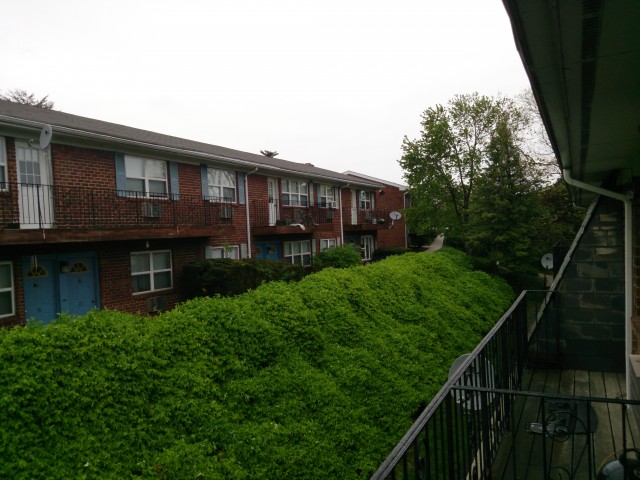
Andrew Cunningham

Andrew Cunningham
I did find the phone's "superior auto" mode to be a bit flaky. It sometimes made odd exposure choices, but in general it took usable quick snapshots. If you don't like the pictures the camera is taking, Sony has provided quite a few manual settings for more experienced shutterbugs. When in the "normal" shooting mode, you have full control of ISO, white balance, and exposure; you can turn the image stabilizer on and off; and you can choose between one of several focus modes, among a few other things.
The camera software also has a few other niceties?HDR and panorama shooting modes are here, of course, alongside burst and timed shooting modes, a collection of vaguely Instagram-esque image filters, and something called "Smile Shutter" that will lock in on your subjects' faces and automatically snap the shutter when they're making a big enough smile (perhaps useful if you're trying to document an elusive baby-smile in pictures).

Andrew Cunningham
All of this is to say that the Xperia ZL has a surprisingly good and useful camera, especially in the context of typical Android phone cameras, but you may need to dive into the manual settings to get the best shots. If you do much photography, this may not come as a surprise to you, but an excellent automatic shooting mode is the most important thing for me in a phone camera (or in any camera where quick snapshots are of prime importance). Most of the time, I'm pretty confident that Apple's software (barebones though it may be) is taking decent-looking pictures in all but the lowest light; in my time with the ZL, its full-auto mode didn't inspire the same confidence.
The 2MP front-facing camera is serviceable for video chatting. It's located in the lower-right corner of the handset rather than near the speaker at the top of the phone, which makes it a bit more usable in landscape mode and a bit more awkward in portrait mode (at least if you're used to above-the-screen cameras).
Source: http://feeds.arstechnica.com/~r/arstechnica/gadgets/~3/jSbMSIUp0II/
spacex tupac hologram tupac back tax deadline death race buffet rule carlos santana
No comments:
Post a Comment
Note: Only a member of this blog may post a comment.